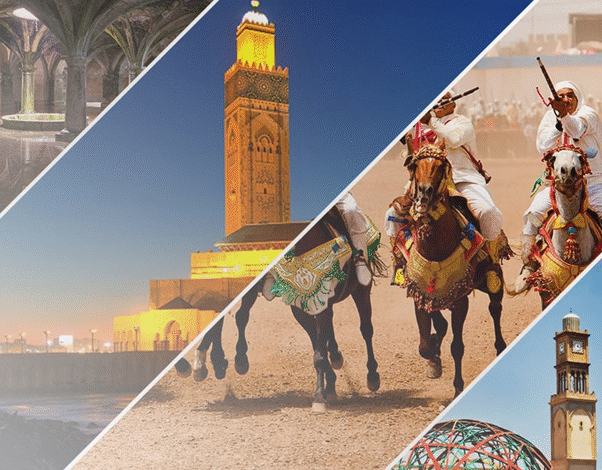Morocco, Africa’s premier tourism destination: The keys to its success
Morocco has firmly established itself as the top tourist destination in Africa, welcoming millions of visitors from around the globe each year. What are the secrets behind this success? Let’s explore.

By Bilkyss Mentari
Situated at the crossroads of Europe, Africa, and the Middle East, Morocco has become a premier tourism hub. Proximity to Spain and France, direct international flights, and modern infrastructure make it exceptionally welcoming to global travelers.
Visionary tourism policy
Beyond its geography, Morocco’s success stems from a proactive tourism strategy—blending modernization with cultural authenticity. Its diverse offerings—beaches, mountains, deserts, historic cities, gastronomy, and craftsmanship—create a rich African experience that appeals to adventurous souls and culture lovers alike.
As former Tourism Minister Lahcen Haddad said, “Morocco’s strategic location makes it a natural gateway between Europe, Africa, and the Middle East. This geographical advantage is a key driver of its attractiveness.”
Strong public & private investment
Over decades, Morocco has pursued ambitious tourism goals through initiatives like Vision 2010 and Vision 2020. Focus has been placed on expanding accommodation capacity, upgrading infrastructure, and improving service quality. Investments in luxury hotels, resort developments, and traditional riad renovations have propelled the country’s appeal.
Former Marrakech Mayor Fatima Zahra El Mansouri has noted: “Marrakech blends its historical heritage with dynamic modern development to offer a truly unique and authentic visitor experience.”
The private sector has also played a pivotal role. Domestic and international investors have seized Morocco’s potential, spurring innovation across hotels, travel agencies, and experiential tourism. As former Tourism Minister Mohamed Sajid articulated: “Morocco’s tourism success rests on a strong public-private partnership—creating a competitive and dynamic sector.”
Cultural & heritage promotion
What sets Morocco apart is its ability to share its history and culture through tourism. Cities like Marrakech, Fès, Casablanca, and Essaouira weave ancient architecture with contemporary life. Morocco understands that tourism should tell a story and preserve identity, weaving its craftsmanship, cuisine, and culture through festivals, curated tours, and creative workshops.
As Moroccan author Leïla Slimani observes: “Traveling in Morocco means discovering a rich, multifaceted culture expressed through its traditions, literature, and handmade craft.” This cultural focus supports local artisans and strengthens employment—especially for women and youth—while encouraging responsible and sustainable tourism.
Digital innovation
What distinguishes Morocco is its rapid embrace of digital transformation. Online booking platforms, global social media marketing, and mobile tourism apps have become essential tools in attracting and retaining international visitors.
Tourism marketing expert Jamal Belahrach emphasizes: “Digital transformation is essential for tourism development. It enhances the customer experience and helps Morocco stand out globally.” Morocco’s digital drive meets the expectations of modern, connected travelers while boosting international visibility.
Challenges ahead
While Morocco leads the way, several obstacles remain for long-term sustainability: managing tourist flows at popular sites, preserving natural resources, enhancing local skills, and expanding to underserved markets such as Sub-Saharan Africa, Asia, and business travel. Maintaining service quality and innovation will be critical amid rising global tourism competition.
Fatima Zahra Benacer, a sustainable tourism advocate, notes: “Sustainable tourism strategies must involve local communities and preserve the environment.”
A sports spotlight
Morocco’s upcoming role as host nation for the African Cup of Nations and the FIFA World Cup provides a global showcase for cultural tourism. Investments in stadiums, transport, and hotels bolster visitor experience and long-term capacity—benefitting tourism well beyond match days.
Prime Minister Aziz Akhannouch affirmed: “Hosting the AFCON and World Cup is a unique opportunity to demonstrate Morocco’s hospitality excellence and highlight our rich cultural heritage and modern infrastructure.”
Morocco’s success is not accidental—it stems from geographic positioning, purposeful policy, cultural storytelling, and bold innovation. As Africa’s leading tourism hub, the country offers a template for sustainable, authentic, and impactful tourism development across the continent.






